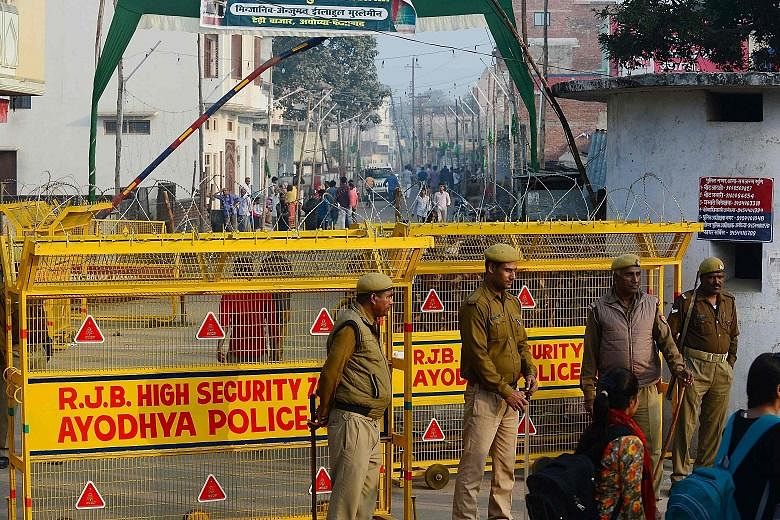NEW DELHI (AFP) - Indian authorities on Saturday (Nov 9) ramped up security across the country for a Supreme Court ruling on a holy site contested for centuries by Hindus and Muslims, which in 1992 sparked some of the deadliest sectarian violence since independence.
Prime Minister Narendra Modi called for calm as police went on alert, with thousands of extra personnel deployed and schools closed in and around the northern city of Ayodhya, centre of the bitter dispute, and elsewhere.
Barricades were erected on roads leading to the Supreme Court building in New Delhi with officials and volunteers scouring social media for inflammatory posts in what is Facebook's biggest market.
The verdict, which - it is hoped - will put an end to an angry and at times arcane decades-old legal wrangle, was due around 10.30am local time (1pm in Singapore).
The case also involves a nonagenarian lawyer representing a Hindu deity.
Hardliners among India's majority Hindus, including supporters of Modi's Hindu nationalist Bharatiya Janata Party (BJP), believe that Lord Ram, the warrior god, was born in Ayodhya.
They say that in the 16th century, Babur, the first of emperor of the Mughal Islamic dynasty, built a mosque on top of a temple at the 2.8-acre (1.1-hectare) site.
In the 1980s, as Hindu nationalism and the BJP began to strengthen, pressure grew for the mosque to be knocked down and replaced by a glorious Hindu temple.
In 1992, a Hindu mob estimated to number 200,000 did just that, reducing the 460-year-old mosque to rubble.
This unleashed some of the worst religious riots since India's bloody partition at the end of British colonial rule in 1947, leaving around 2,000 people dead, mainly Muslims.
Ten years later in 2002, after 59 Hindu activists died in a blaze on a train from Ayodhya, riots in Gujarat state - when Modi was its chief minister - saw upwards of 1,000 people perish, again largely Muslims.
The Supreme Court case centres on the ownership of the site.
In 2010, a High Court ruled that Muslims and Hindus should split it - albeit unevenly, with Hindus granted the lion's share.
This left no one happy. Both Hindu and Muslim groups appealed and the Supreme Court in 2011 stayed the lower court's ruling, leaving the issue unresolved.
HINDU HEGEMONY
The BJP has campaigned for years for a temple to be built at Ayodhya, and a verdict clearing the way for that would be a major victory for the 69-year-old Modi, just months into his second term.
But it will also send shudders through many in the 200-million-strong Muslim minority who fear that the BJP is bent on turning India into a purely Hindu nation.
Modi is nevertheless desperate to avoid bloodshed and ahead of the verdict, the BJP and the more hardline RSS organisation have told supporters to avoid any provocative celebrations.
Muslim groups have also appealed for calm.
"Whatever is the verdict by the Supreme Court, it won't be anybody's win or loss," Modi tweeted late Friday.
"My appeal to the people of India is that our priority is to ensure the verdict strengthens the values of peace, equality and goodwill of our country."
In addition to 500 arrests of would-be trouble-makers, Uttar Pradesh state police chief O.P. Singh told the Economic Times that 10,000 "anti-social" elements had been identified.
Around 16,000 digital volunteers from 1,600 villages in the region have also been enlisted to help monitor and flag contentious content on social media.
Already on Friday, a 56-year-old man in Maharashtra state was arrested for posting on Facebook that he hoped the verdict would remove a "dark spot of history", the Press Trust of India reported.

